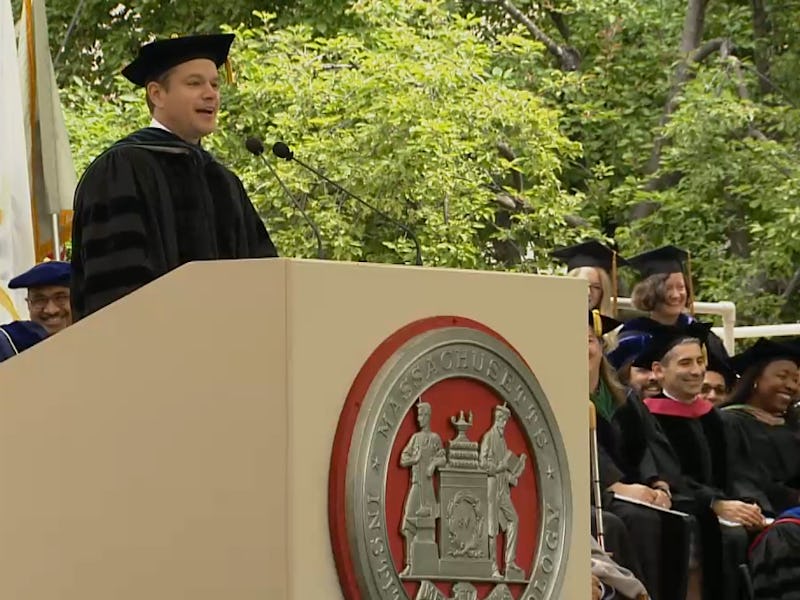At MIT, Matt Damon Wonders Aloud, "What If All of This Is a Simulation?"
“What if this, all of this, is a simulation?”

What if our world is just a simulation run by a more advanced civilization? That’s the question that guided Matt Damon’s commencement address at the Massachusetts Institute of Technology this morning. And only at MIT can that question legitimately address theoretical physics and issues of social responsibility.
Damon addressed the 2016 graduating class with a singular aim — to encourage the students to tackle issues in the “world’s worst buffet.” To do so, he adopted a face familiar to the halls of MIT, a goodwill marriage of genius to social action. Instead of overalls and a mop, the Goodwill Hunting star, now 45, stood on the campus in a cap and gown, but without a college degree. MIT doesn’t offer them to commencement speakers, Damon noted with regret. But his lack of accolades didn’t stop Damon for dropping a paradigm shift on the MIT grads:
It’s called simulation theory. Created by Nick Bostrom, a philosopher at the University of Oxford, in 2003, it’s the idea that a more advanced civilization would be able to run simulations of evolutionary history. After hearing about it, “it got me to thinking,” says Damon, “what if this, all of this, is a simulation? I mean — it’s a crazy idea, but what if it is?”
Damon in the 1997 movie 'Goodwill Hunting.'
The idea that we’re all just part of a giant video game, has a 50:50 chance of being true, says Neil deGrasse Tyson.
On Wednesday, Elon Musk brought the same idea to Recode’s annual Code Conference, giving us a one in a billion chance of being in base reality. And there could be trillions of simulations of our world. To this Damon quips, “And if there are multiple simulations, how come we have to be in the one where Donald Trump becomes the Republican nominee for president?”
But then Damon gets serious. If we are just a simulation, he says, he was offered some advice by MIT physicist Max Tegmark, “Go out and do really interesting things, so the simulators don’t shut you down.” If we aren’t a simulation, “either way, my answer is the same. Either way, what we do matters. What we do affects the outcome,” Damon says to the graduates, “because this world, real or imagined, this world has some problems that we need you to drop everything and solve.”
And Damon doesn’t pull any punches, as he rattles off a list of world issues, which include: economic inequality, the refugee crisis, massive global instability, pandemics, climate change, institutionalized racism, Brexit, and failures of American politics, the media, and a banking system that steals people’s money.
Although science and technology may not be the solution to every problem, he points out, they are integral to solving them. “This is a fact, this is not fiction,” Damon says, “This improbable thing is actually happening. There is more at stake today, than in any story ever told.”
Looking out at the crowd, Damon said, “I hope you’ll turn toward the problem of your choosing. I hope you’ll drop everything, and I hope you’ll solve it”. A dramatic pause, and Damon closes, “Ready Player One?” he asks. “Your game begins now.”